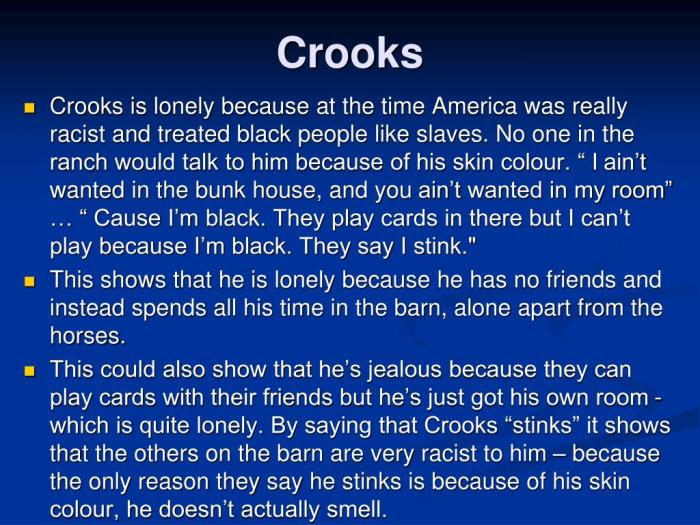Crooks loneliness quotes with page numbers – Crooks’ loneliness quotes with page numbersoffer profound insights into the isolating experiences of a marginalized character in John Steinbeck’s “Of Mice and Men.” These quotes illuminate the extent of Crooks’ solitude, its causes, and its impact on his sense of self and connection to others.
Through Crooks’ poignant words, readers witness the devastating effects of loneliness and isolation on an individual’s emotional well-being and sense of belonging.
Loneliness and Isolation in Crooks’ Character: Crooks Loneliness Quotes With Page Numbers

Crooks’ character in John Steinbeck’s “Of Mice and Men” is a poignant depiction of loneliness and isolation. As the only black stable buck on the ranch, Crooks faces multiple layers of social exclusion due to his race and physical disability.
Crooks’ physical separation from the other ranch hands, living in a detached room next to the barn, symbolizes his social isolation. His race further alienates him from the white community, creating an invisible barrier that prevents him from fully participating in the camaraderie of the ranch.
Loneliness as a Barrier to Connection
Crooks’ loneliness has a profound impact on his ability to form meaningful relationships. His isolation prevents him from connecting with others on a deeper level, leaving him emotionally isolated and vulnerable.
The emotional toll of Crooks’ loneliness is evident in his withdrawn nature and his inability to trust others. He is hesitant to share his thoughts and feelings, fearing rejection and judgment. This emotional isolation further perpetuates his sense of loneliness, creating a vicious cycle.
The Power of Books and Imagination, Crooks loneliness quotes with page numbers
Despite the challenges he faces, Crooks finds solace in the world of books and imagination. Literature provides him with a sense of companionship and an escape from his lonely reality.
Through books, Crooks connects with the outside world and experiences the lives of others. He is particularly drawn to stories about black characters, finding a sense of kinship and validation in their struggles and triumphs.
Crooks’ Loneliness in the Context of the Novel
Crooks’ loneliness is not an isolated experience but reflects broader themes of loneliness and social isolation in the novel. Other characters, such as Lennie and George, also experience different forms of loneliness, highlighting the pervasive nature of this human condition.
Crooks’ isolation contributes to the overall atmosphere of the novel, creating a sense of alienation and despair. It also serves as a commentary on the social and economic conditions of the Great Depression, where individuals were often isolated and vulnerable.
The Impact of Loneliness on Identity
Loneliness has a profound impact on Crooks’ sense of self and identity. His isolation and exclusion shape his perceptions of himself and others, leading to feelings of inferiority and self-doubt.
Crooks’ loneliness can also lead to self-destructive behavior or alienation. His desire for connection can drive him to seek unhealthy relationships or withdraw from society altogether.
Loneliness as a Literary Device
Steinbeck uses Crooks’ loneliness as a powerful literary device to explore broader themes of isolation, prejudice, and the human need for connection.
Crooks’ isolation symbolizes the social and racial barriers that divide society, while his yearning for companionship highlights the universal human desire for belonging. Through Crooks’ character, Steinbeck explores the devastating effects of loneliness and the importance of human connection.
Key Questions Answered
What is the significance of Crooks’ isolation in the novel?
Crooks’ isolation is a central theme that highlights the prejudice and social stratification prevalent during the Great Depression era.
How does Crooks cope with his loneliness?
Crooks finds solace in reading books, which provide him with a sense of companionship and escape from his isolation.
What is the symbolism associated with Crooks’ room?
Crooks’ room represents a physical and emotional sanctuary, a space where he can retreat from the harsh realities of the outside world.


